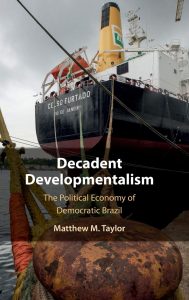Dr Mark S. Langevin
January 25th, 2021
Book Review: Decadent Developmentalism: The Political Economy of Democratic Brazil by Matthew M. Taylor
In Decadent Developmentalism: The Political Economy of Democratic Brazil, Matthew M. Taylor advances a comprehensive account of Brazil’s decades-long boom-and-bust development trajectory. Taylor pierces through the ideology of developmentalism to offer an institutional and policy examination of the country’s ‘low growth equilibrium’ in order to explain a series of disappointing developmental outcomes, including a social security system that concentrates income and labour market regulations that effectively divide society between privilege and exploitation, writes Mark S. Langevin.
Decadent Developmentalism: The Political Economy of Democratic Brazil. Matthew M. Taylor. Cambridge University Press. 2020.
 Find this book (affiliate link):
Find this book (affiliate link): ![]()
Decadent Developmentalism is as sober as it is provocative, offering an institutionalist analysis of Brazil’s decades-long boom-and-bust development trajectory. Thread by thread, Taylor weaves a tapestry of institutional and policy evaluations that explain how this exceptional nation has fallen short of its promise. The book sets out to explain the ‘low growth equilibrium’, or the sustained patterns of below-average economic growth, educational achievement, infrastructure investment and productivity – along with pervasive inequality – since the transition to democracy in 1985.
Taylor pulls from the comparative political economy literature to offer up an explanatory framework, anchored to the notion of ‘institutional complementarities’, revealing an incentive structure that leads firms and politicians to pursue strategies that are ‘individually first-best, but collectively suboptimal’. While the book is an ‘unabashedly single country study’, its theoretical contributions merit just as much attention as its examination of Brazilian political economy.
Decadent Developmentalism baits a much needed political debate in Brazil, after a lost decade marked by disappointing economic development, world-class corruption, the impeachmentof former President Dilma Rousseff and the emergence of a populist-authoritarian movement headed by President Jair Bolsonaro. The title of the book may inflame partisan passions across Brazil’s political spectrum, but its contents represent a well-intentioned examination of those institutions that may be most responsible for Brazil’s developmental paralysis. The author conceptualises institutional complementarities and then applies the notion to an explanation of how they unfold to sustain and reinforce a perverse set of incentives for domestic firms and political factions. Taylor does not discard path-dependency and interest group-based explanations, but he seeks to encompass these theoretical approaches within his explanatory framework.
The book proceeds to detail the five primary domains through which institutional complementarities tend to sustain Brazil’s morass of economic disappointments and political corruption, as well as propel a few steps toward progress. These include: the developmental state; an autonomous government bureaucracy; weak regulatory control; coalitional presidentialism; and what Taylor theorises as the ‘developmental hierarchical market economy’ (DHME). These can be interpreted as attributes of standard variables in comparative political economy, but the author employs them to distinguish Brazil and offer a critique of the shortcomings of Brazil’s ‘neo-developmentalist’ paradigm. A quick glance at Figure 1.2 on page 13 shows the dozens of possible relations or complementarities that can be operationalised from these institutional spaces. Taylor treats each domain by dividing the book into two parts: the first part examines the complementarities within the economic sphere, and the second focuses on the state and its economic, legal and political underpinnings.

Taylor respects Brazil’s intellectual history by offering a rich discussion of the ‘developmental state’, thereby setting up his evaluation of its institutional and policy impacts on economic and social development. He critically examines the relations between firms and the government, with a focus on Brazilian private sector companies with close economic and political ties to the federal government, state-owned enterprises (SOEs) and public sector pension funds. Taylor’s focus on Brazil’s ‘investor state’ reveals the institutional complementarities that allow private interests to become embedded within public institutions.
Much of his examination pivots on ‘cross-shareholding’ and weak regulation wherein successive administrations, begged on by congressional leaders, have chosen to favour influential Brazilian enterprises with favourable public financing, often through the Brazilian Economic and Social Development Bank (BNDES). Taylor illustrates the effect with repeated references to the Brazilian animal protein company JBS, whose owners successfully extracted a fortune in favorable BNDES financing to reach the commanding heights of the global market, but without providing much in return. The book accounts for the case of JBS, as well as the major construction firms that were implicated (and their executives convicted) in the Lava Jato corruption scandal, as the product of complementarities between the economy, the structure of firms and the institutional contours of the federal government, namely coalitional presidentialism and weak regulatory control. These cases also illustrate the segmentation found between firms (domestic versus transnational) and within the labour market (formal versus informal) to frame and sustain what Taylor calls the DHME that has failed to deliver since the promulgation of the 1988 constitution.
The book effectively diagnoses Brazil’s institutional maladies with precision and overwhelming evidence, even if the notion of institutional complementarities is underdeveloped as a comparable concept. While Taylor falls short of erecting a comparable analytical framework, he nonetheless offers a persuasive argument. In sum, the federal government’s propensity to force public finance in political directions and its poor regulatory performance cause suboptimal collective outcomes, including a social security system that concentrates income and labour market regulations that effectively divide society between privilege and exploitation.
In Chapter Six, ‘Rents, Control, and Reciprocity’, Taylor pinpoints the causal mechanisms that trigger the low growth equilibrium and the other elements that poison Brazil’s economic and social development. He applies his analysis across a diverse set of critical, or least illustrative, cases, including the Plano Brazil Maior stimulus programme, the Manaus Free Trade Zone, the INOVARautomotive manufacturing scheme and the ethanol fuel policy, demonstrating the willingness of successive governments to offer generous rents to firms without effective regulatory control or the type of strategic policy management needed to compel firms to become more productive and competitive. For Taylor, the persistence of ‘lackluster control’ stems from politics, the fragmented party system and its corollary, coalitional presidentialism, along with weak strategic coordination across executive branch agencies. More than any other element of the book, Chapter Six provides the most convincing argument that successive Brazilian governments have been ‘ineffective at the essentially political act of controlling the distribution of rents in ways that channel business energies in strategically productive long-term directions’ (192).
Taylor’s evaluation is both careful and conciliatory, but it leaves most of the problem at the doorsteps of Brazil’s political institutions and their feeble capacity to aggregate broad, national interests in the face of the competing private interests of Brazil’s wealthy and well-connected.
Although his book examines labour market segmentation, it does not fully account for the debilitating effects of informal, and often repressive, labour regimes upon developmental outcomes. The mere fact that around half of Brazilian workers labour in the informal sector, far from institutional protections including the constitutional rights to worker association and collective bargaining, explains much about a political system that cannot, or will not, offer strategic economic management and sustained income redistribution. Most Brazilians simply cannot afford to articulate their collective, broad-based interests in Brasília, leaving a well-organised plurality, composed of Brazilian business leaders and professional associations, to squabble over rents and dodge the demands of state-society reciprocity.
Decadent Developmentalism provides an impressive policy evaluation toolkit for understanding, and perhaps even eliminating, the incentives that propel private interests above national policy goals. Taylor’s book teaches us about good governance, but a majority of Brazilians still need to discover how best to articulate and safeguard their collective, national interests to secure formal employment, progressive taxation and equal protection under the law.
Note: This review gives the views of the author, and not the position of the LSE Review of Books blog, or of the London School of Economics. The LSE RB blog may receive a small commission if you choose to make a purchase through the above Amazon affiliate link. This is entirely independent of the coverage of the book on LSE Review of Books.
Image Credit: Photo by Vanessa Bumbeers on Unsplash.

Nenhum comentário:
Postar um comentário